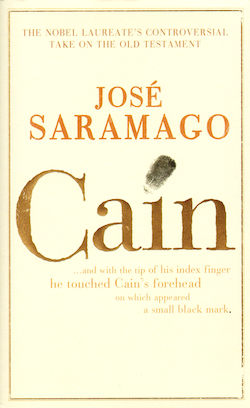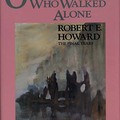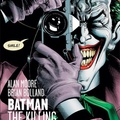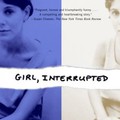José Saramago: Cain

Cain is the last novel by José Saramago and I was somewhat afraid that for this reason it might lack that wit, originality and playfulness which characterize his earlier books. But it soon turned out that this was not case, and Cain isn't just an afterthought at the end of a lifetime, but an excellent, fresh novel – it's a worthy closing piece of a great oeuvre.
Even though the protagonist of the novel is Cain, the story starts not with him but with Adam, Eve and their life in Paradise. But Saramago deviates from the usual depictions of Paradise right at the beginning, and he makes God out as a rather ridiculous being. It turns out that God is not pleased with his creations: Adam and Eve cannot speak, and God knows that he has to blame himself for this. To rectify the situation, he swiftly and thoughtlessly places tongues in their mouths and then leaves them to fend for themselves in the Garden of Eden.
Afterwards things happen more or less in the way known from the Bible: Adam and Eve are expelled from Paradise; their children are born; Cain kills Abel, after which God punishes him by marking his forehead and by condemning him to eternal wandering. And the real story unfolds during the course of Cain's wanderings.
During his ramblings, Cain sometimes unexpectedly finds himself at different, unknown places and times, and this way he witnesses several well-known Biblical events: he's there when Abraham is getting ready to sacrifice Isaac; he's there when Jericho is destroyed; and he's also there when Satan tempts the god-fearing Job. And Cain doesn't only observe these events – he often interferes, and tries to change them. After living through a whole lot of bloody and cruel episodes, his opinion about God deteriorates rapidly, and he gives voice to his doubts during his bitter and passionate arguments with God.
It's quite obvious from the very beginning that Saramago's God is neither benevolent, nor fearsome, nor omnipotent. And while we follow Cain's adventures, we get more and more proof of his impotence, and we can ascertain that this God is dumb, inconsistent, cruel, selfish, indecisive, inhuman, and prone to making one mistake after the other.
Of course we should bear in mind that we see God's actions through the eyes of the first murderer of humankind. Cain is by no means irreproachable – he's an impetuous, instinctive, stubborn, and rather immoral man, and he often gets into unpleasant situations due to these characteristics. So it's rather ironic that Cain dares to criticize God even though he's very much like Him. Still, in the end Cain – with all his human weaknesses and sins – appears to be a wiser and more humane being than God with his godly weaknesses and sins.
As regards the style of the novel, it's the same as the style of the earlier works of Saramago: the sentences are paragraph-long; the dialogs are not set apart from the descriptive parts in the usual way; and the narrator often comments ironically or pragmatically on certain events, and he addresses these comments directly to the reader.
I guess that Saramago's stylistic oddities and his disrespectful, doubting, desecrating tone might not equally please every reader. As for me, I highly appreciate his unique style and playfulness, and I don't find his tone disagreeable because I feel that behind all his lack of respect, there's the philosophy that human beings are the most sacred and precious entities in this world.
But even though this novel features Saramago's trademark humanism, Cain is still his most bitter and pessimistic novel I've read so far (I don't know all his books yet.) Cain's wanderings and time travels seem to be postmodern, somewhat aimless games for a while – but then it turns out what consequences these travels have, and the end of the story leaves the reader with very little hope for humankind.
Even though the protagonist of the novel is Cain, the story starts not with him but with Adam, Eve and their life in Paradise. But Saramago deviates from the usual depictions of Paradise right at the beginning, and he makes God out as a rather ridiculous being. It turns out that God is not pleased with his creations: Adam and Eve cannot speak, and God knows that he has to blame himself for this. To rectify the situation, he swiftly and thoughtlessly places tongues in their mouths and then leaves them to fend for themselves in the Garden of Eden.
Afterwards things happen more or less in the way known from the Bible: Adam and Eve are expelled from Paradise; their children are born; Cain kills Abel, after which God punishes him by marking his forehead and by condemning him to eternal wandering. And the real story unfolds during the course of Cain's wanderings.
During his ramblings, Cain sometimes unexpectedly finds himself at different, unknown places and times, and this way he witnesses several well-known Biblical events: he's there when Abraham is getting ready to sacrifice Isaac; he's there when Jericho is destroyed; and he's also there when Satan tempts the god-fearing Job. And Cain doesn't only observe these events – he often interferes, and tries to change them. After living through a whole lot of bloody and cruel episodes, his opinion about God deteriorates rapidly, and he gives voice to his doubts during his bitter and passionate arguments with God.
It's quite obvious from the very beginning that Saramago's God is neither benevolent, nor fearsome, nor omnipotent. And while we follow Cain's adventures, we get more and more proof of his impotence, and we can ascertain that this God is dumb, inconsistent, cruel, selfish, indecisive, inhuman, and prone to making one mistake after the other.
Of course we should bear in mind that we see God's actions through the eyes of the first murderer of humankind. Cain is by no means irreproachable – he's an impetuous, instinctive, stubborn, and rather immoral man, and he often gets into unpleasant situations due to these characteristics. So it's rather ironic that Cain dares to criticize God even though he's very much like Him. Still, in the end Cain – with all his human weaknesses and sins – appears to be a wiser and more humane being than God with his godly weaknesses and sins.
As regards the style of the novel, it's the same as the style of the earlier works of Saramago: the sentences are paragraph-long; the dialogs are not set apart from the descriptive parts in the usual way; and the narrator often comments ironically or pragmatically on certain events, and he addresses these comments directly to the reader.
I guess that Saramago's stylistic oddities and his disrespectful, doubting, desecrating tone might not equally please every reader. As for me, I highly appreciate his unique style and playfulness, and I don't find his tone disagreeable because I feel that behind all his lack of respect, there's the philosophy that human beings are the most sacred and precious entities in this world.
But even though this novel features Saramago's trademark humanism, Cain is still his most bitter and pessimistic novel I've read so far (I don't know all his books yet.) Cain's wanderings and time travels seem to be postmodern, somewhat aimless games for a while – but then it turns out what consequences these travels have, and the end of the story leaves the reader with very little hope for humankind.





